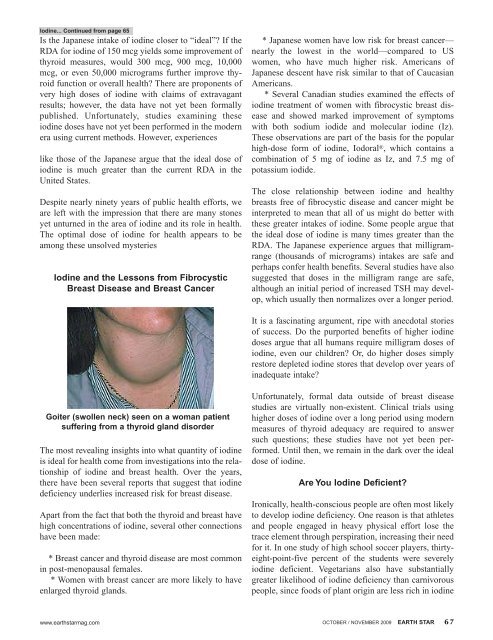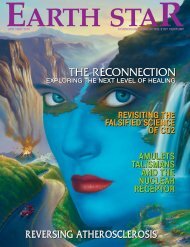WILD ATTRACTION WILD ATTRACTION - Earthstar
WILD ATTRACTION WILD ATTRACTION - Earthstar
WILD ATTRACTION WILD ATTRACTION - Earthstar
- No tags were found...
Create successful ePaper yourself
Turn your PDF publications into a flip-book with our unique Google optimized e-Paper software.
Iodine... Continued from page 65Is the Japanese intake of iodine closer to “ideal”? If theRDA for iodine of 150 mcg yields some improvement ofthyroid measures, would 300 mcg, 900 mcg, 10,000mcg, or even 50,000 micrograms further improve thyroidfunction or overall health? There are proponents ofvery high doses of iodine with claims of extravagantresults; however, the data have not yet been formallypublished. Unfortunately, studies examining theseiodine doses have not yet been performed in the modernera using current methods. However, experienceslike those of the Japanese argue that the ideal dose ofiodine is much greater than the current RDA in theUnited States.Despite nearly ninety years of public health efforts, weare left with the impression that there are many stonesyet unturned in the area of iodine and its role in health.The optimal dose of iodine for health appears to beamong these unsolved mysteriesIodine and the Lessons from FibrocysticBreast Disease and Breast Cancer* Japanese women have low risk for breast cancer—nearly the lowest in the world—compared to USwomen, who have much higher risk. Americans ofJapanese descent have risk similar to that of CaucasianAmericans.* Several Canadian studies examined the effects ofiodine treatment of women with fibrocystic breast diseaseand showed marked improvement of symptomswith both sodium iodide and molecular iodine (Iz).These observations are part of the basis for the popularhigh-dose form of iodine, Iodoral ® ,which contains acombination of 5 mg of iodine as Iz, and 7.5 mg ofpotassium iodide.The close relationship between iodine and healthybreasts free of fibrocystic disease and cancer might beinterpreted to mean that all of us might do better withthese greater intakes of iodine. Some people argue thatthe ideal dose of iodine is many times greater than theRDA. The Japanese experience argues that milligramrange(thousands of micrograms) intakes are safe andperhaps confer health benefits. Several studies have alsosuggested that doses in the milligram range are safe,although an initial period of increased TSH may develop,which usually then normalizes over a longer period.It is a fascinating argument, ripe with anecdotal storiesof success. Do the purported benefits of higher iodinedoses argue that all humans require milligram doses ofiodine, even our children? Or, do higher doses simplyrestore depleted iodine stores that develop over years ofinadequate intake?Goiter (swollen neck) seen on a woman patientsuffering from a thyroid gland disorderThe most revealing insights into what quantity of iodineis ideal for health come from investigations into the relationshipof iodine and breast health. Over the years,there have been several reports that suggest that iodinedeficiency underlies increased risk for breast disease.Apart from the fact that both the thyroid and breast havehigh concentrations of iodine, several other connectionshave been made:* Breast cancer and thyroid disease are most commonin post-menopausal females.* Women with breast cancer are more likely to haveenlarged thyroid glands.Unfortunately, formal data outside of breast diseasestudies are virtually non-existent. Clinical trials usinghigher doses of iodine over a long period using modernmeasures of thyroid adequacy are required to answersuch questions; these studies have not yet been performed.Until then, we remain in the dark over the idealdose of iodine.Are You Iodine Deficient?Ironically, health-conscious people are often most likelyto develop iodine deficiency. One reason is that athletesand people engaged in heavy physical effort lose thetrace element through perspiration, increasing their needfor it. In one study of high school soccer players, thirtyeight-point-fivepercent of the students were severelyiodine deficient. Vegetarians also have substantiallygreater likelihood of iodine deficiency than carnivorouspeople, since foods of plant origin are less rich in iodinewww.earthstarmag.com OCTOBER / NOVEMBER 2009 EARTH STAR 67
















